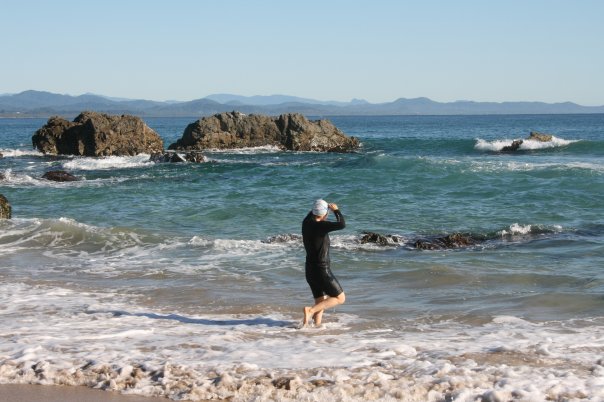Surviving being me
/I swim in the sea, or I used to. I haven’t finished a swim since I saw a shark two years ago. I don’t know what kind of shark it was, but it was bigger than me. Just before it appeared, a thought came into my head: “You’re going to see a shark and it will be all right.” By the time I’d formulated “No!” there it was, just below and to the right of me in the water.
It’s entirely possible I channeled the shark, having spent years worrying about them while swimming. When my son was four, he tried to help. Sharks don’t really like the taste of humans, he told me. “They take one bite because they think you’re a seal.” If it’s a big shark, it will be a big bite, he said. He gave me an appraising look. “Maybe don’t wear those black togs,” moving closer, confiding, “and definitely, do not swim breast stroke.” A couple of years later, I read an article about what to do if a shark attacks you. Make yourself vertical in the water, it suggested, so the shark can’t get a purchase. And if it’s coming round for seconds, punch it in the face. I managed to conjure an image of myself, kicking with my remaining leg to move to a vertical position, but I could not form a vision of me punching a shark.
The morning I saw the shark, I swam to shore as fast as I could, without kicking so I wouldn’t stir the water. I sprinted back to my family along the beach, my heart beating like a drum for minutes and minutes after I stopped.
In Surviving Survival: The Art and Science of Resilience, US writer Laurence Gonzales tells stories of those who’ve survived in the long term, even thrived, following real trauma. A woman and her husband, both horribly injured by a bear in Canada, had different trajectories. She became more fearful, couldn’t even walk in the woods near her home, eventually suicided. Her husband was the opposite. He put the experience behind him and returned to hiking, grateful to be alive.
Gonzales says sensitive folk don’t do well when it comes to recovering from trauma, but they may be better at sensing and avoiding danger in the first place. A woman he interviewed experienced fear about a colleague who took her to the company farm with an axe in the back of the car. She had a sudden feeling the colleague was going to kill her. He didn’t; he gave her a necklace and she felt silly. They married, had children. After two decades of abuse, he shot her. Her fear in the woods was presentiment. The woman attacked by the bear experienced a similar fear. I saw the shark in my mind before I saw it.
Gonzales believes we lay down particularly detailed memories during trauma. Once, this had an evolutionary role – we knew danger if we faced it again. The trouble is we’re unlikely to face the bear again and the memories can mess with our heads. Rather than focusing on the experience over and over, by, say, writing a column about it, we need to rewire the brain, Gonzales says, so we can live. One of the ways to do this is to use higher level defence mechanisms like distraction and humour which allow some acceptance of the experience without reliving it.
While I’m all for humour, I’m also from the get-it-all-out-and-howl kind of approach to life’s tribulations, where defence mechanisms don’t sit comfortably. Not for me namby-pamby distraction, mindfulness, observing my fear. I am my fear. Let me re-experience it. And tell you about it. Again and again.
But it’s not helping me swim. I’ve tried, more than once. I swim out beyond the break but as soon as the water’s deep and I can look down and see the green merging into the black, I think shark, feel fear and head for shore. I need to swim in the sea again, it’s part of who I am. But I’m starting to understand that I won’t manage it by peering into the black and thinking shark. I’ll manage it by putting one arm up and over, breathing, putting the other arm up and over, breathing, and in this way going forward. I’ll manage it by swimming.
First published in The Courier-Mail Qweekend 9 February 2013. Get in touch about sharks, swimming or anything else.
Mary-Rose is writing about writing, women, families, children and birth at the moment, and you can tick the box to receive emails, or Like Writer Mary-Rose MacColl on Facebook or follow MaryRoseMacColl on Twitter.

